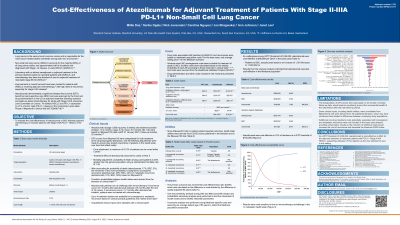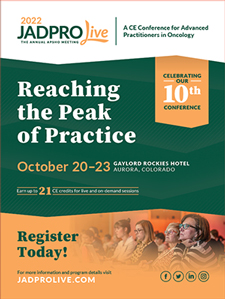Back

Industry Encore Posters
JL1006E: Cost-effectiveness of atezolizumab for adjuvant treatment of patients with stage II-IIIA PD-L1+ non-small cell lung cancer
Saturday, October 22, 2022
10:00 AM – 11:00 AM ET

Poster Presenter(s)
Introduction
Chemotherapy was the historical standard of care for adjuvant treatment of early-stage resectable NSCLC. Atezolizumab demonstrated a significant disease-free survival (DFS) benefit versus best supportive care (BSC) as adjuvant treatment following resection and platinum-based chemotherapy for adults with stage II-IIIA (AJCC 7th edition) NSCLC and PD-L1 expression on ≥1% of tumor cells (PD-L1+). This regimen was FDA-approved based on the randomized, open-label, phase 3 IMpower010 clinical trial (NCT02486718). Understanding the economic impact of therapeutic innovations is essential to prioritizing healthcare resources. This study evaluated the cost-effectiveness of atezolizumab vs BSC in this setting from a US commercial payer perspective.
Methods
A Markov model was developed where patients with DFS can progress to locoregional, first- or second-line metastatic recurrence and death. Starting age for all patients was 61 years. A lifetime time horizon and 3% discount rate were used. Treatment duration, DFS and other clinical inputs were derived from IMpower010 (data cutoff: 21 January 2021). Other clinical inputs, utilities and costs were derived from the literature and the IMpower150 (NCT02366143), IMpower110 (NCT02409342) and OAK (NCT02008227) trials. Unpublished clinical inputs were validated with a clinical expert. Sensitivity analyses were performed to test the robustness of model results and identify influential parameters.
Results
In the base case, atezolizumab was cost-effective at $61,454 per quality-adjusted life-year (QALY), below the willingness-to-pay (WTP) threshold of $150,000. Atezolizumab was cost-effective in 89% of iterations at $150,000 WTP. Atezolizumab drug costs were partially offset by savings from longer time in DFS and fewer recurrences. Results were most sensitive to choice of DFS distribution, duration of treatment effect and time to immunotherapy rechallenge after recurrence.
Conclusion
Atezolizumab is cost-effective vs BSC as part of adjuvant treatment for patients with early stage, resected PD-L1+ NSCLC, supporting utilization of this regimen as the new standard of care in this setting.
Table & Figure
JL1006E Table & Figure
To view the table, please click on this link from the e-poster gallery on jadprolive.com
Chemotherapy was the historical standard of care for adjuvant treatment of early-stage resectable NSCLC. Atezolizumab demonstrated a significant disease-free survival (DFS) benefit versus best supportive care (BSC) as adjuvant treatment following resection and platinum-based chemotherapy for adults with stage II-IIIA (AJCC 7th edition) NSCLC and PD-L1 expression on ≥1% of tumor cells (PD-L1+). This regimen was FDA-approved based on the randomized, open-label, phase 3 IMpower010 clinical trial (NCT02486718). Understanding the economic impact of therapeutic innovations is essential to prioritizing healthcare resources. This study evaluated the cost-effectiveness of atezolizumab vs BSC in this setting from a US commercial payer perspective.
Methods
A Markov model was developed where patients with DFS can progress to locoregional, first- or second-line metastatic recurrence and death. Starting age for all patients was 61 years. A lifetime time horizon and 3% discount rate were used. Treatment duration, DFS and other clinical inputs were derived from IMpower010 (data cutoff: 21 January 2021). Other clinical inputs, utilities and costs were derived from the literature and the IMpower150 (NCT02366143), IMpower110 (NCT02409342) and OAK (NCT02008227) trials. Unpublished clinical inputs were validated with a clinical expert. Sensitivity analyses were performed to test the robustness of model results and identify influential parameters.
Results
In the base case, atezolizumab was cost-effective at $61,454 per quality-adjusted life-year (QALY), below the willingness-to-pay (WTP) threshold of $150,000. Atezolizumab was cost-effective in 89% of iterations at $150,000 WTP. Atezolizumab drug costs were partially offset by savings from longer time in DFS and fewer recurrences. Results were most sensitive to choice of DFS distribution, duration of treatment effect and time to immunotherapy rechallenge after recurrence.
Conclusion
Atezolizumab is cost-effective vs BSC as part of adjuvant treatment for patients with early stage, resected PD-L1+ NSCLC, supporting utilization of this regimen as the new standard of care in this setting.
Table & Figure
JL1006E Table & Figure
To view the table, please click on this link from the e-poster gallery on jadprolive.com


